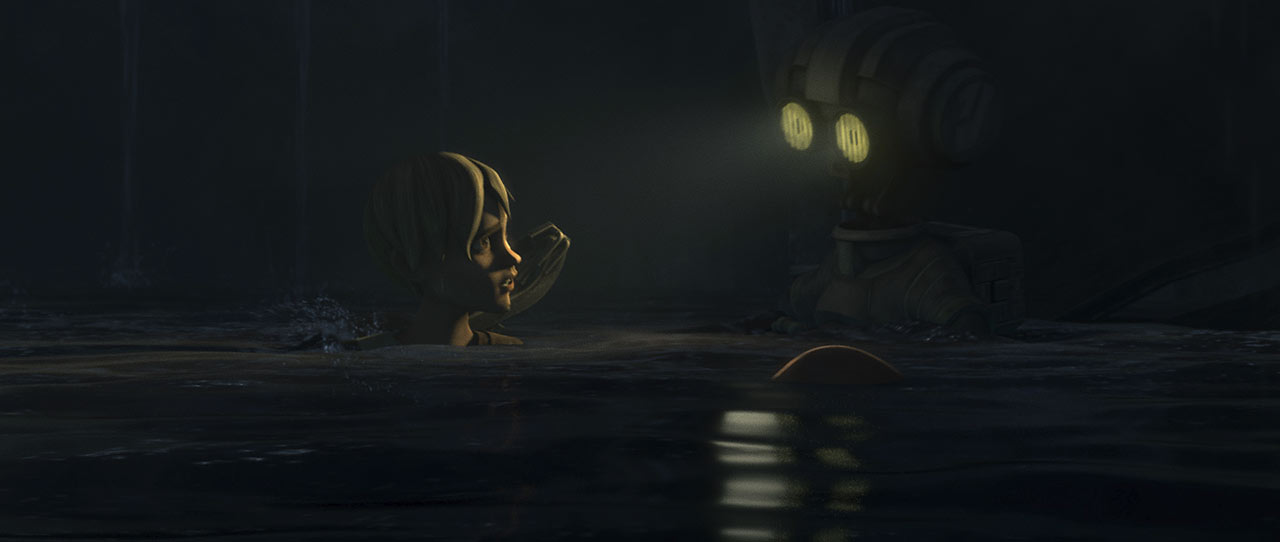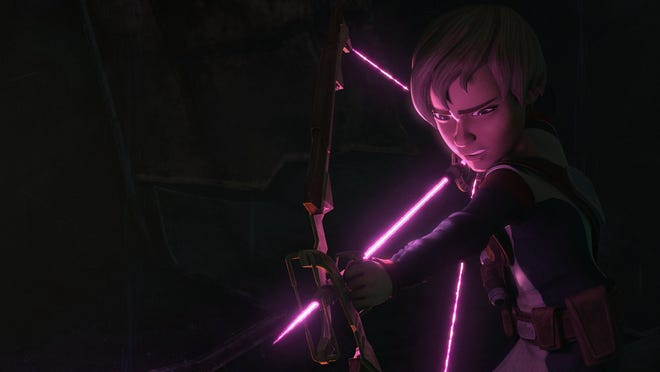The long awaited season finale of Star Wars: The Bad Batch premiered on Friday. Earlier last week, it was announced the series has been renewed for season two.
The Plot
“Kamino Lost” opens where the previous episode left off: the Bad Batch scrambling to escape a sinking city.
As they struggle to escape the flooding waters, they find their way back to Nala Se’s lab, reintroducing the concept to Hunter and Crosshair, who weren’t there for the first explanation, that this is where their genetic mutations were enhanced. Tech makes the comment that technically, Omega is older than them.
Crosshair is characteristically grumpy, drawing a comment from Tech that his severe and rigid attitude is in his nature, impossible to change by either those around him or himself. After a few pointed comments from Crosshair that they shouldn’t be letting Omega call all the shots, the Bad Batch decide to use the cloning pods as “lifeboats” to make it to the surface. AZI guides these makeshift lifeboats through the sinking debris, but runs out of power midway through the operation, floating dark-eyed into the ocean depths.
Omega opens her lifeboat to save AZI, while Crosshair aims a gun with a grappling hook to drag them both to the surface. Perhaps Tech is misguided that change is impossible for Crosshair, or perhaps he’s right as Crosshair later treats his actions as a transactional exchange: a life for a life.
Crosshair does not rejoin the Bad Batch, in part because he does not take the Empire’s abandonment of him personally. A sad version of the theme song plays as the Bad Batch leaves him behind again–this time of his own choosing.
The episode closes with the Empire making cryptic remarks about the great things they have in store for Nala Se’s scientific skills.
The Good

This episode wasn’t necessarily bad, but the failings of the previous episodes do not provide the solid support to deliver an emotionally impactful closing to an inconsistent first season. With so much of the episode spent on the run, the characters simply do not have time to indulge in emotional drama. I do understand that this is ultimately a fantasy adventure against a science fiction backdrop, but there has to be character substance. It can’t just be plot alone.
Remarks like Tech’s regarding Crosshair’s unchangeable nature is interesting, and Anakin’s character arc presents plenty of material for the Bad Batch narrative to complement, but there really isn’t a moment to explore it in a way that makes sense to the reader simply because the narrative has chosen to spend very little time with Crosshair. The time that was spent with him was primarily when he still had the inhibitor chip, and since the fact he lost it was presented as a plot twist, there is zero insight into Crosshair’s decision, motivations, etc.
Crosshair censures Hunter for taking things too personally when he points out that they’re only fighting for their lives because the Empire left them behind. Since Crosshair very much took the Bad Batch abandoning him personally, it’s curious why he’s so nonchalant about the Empire doing the same thing, even believing that he can still be part of it.
People are full of contradictions, so it’s not that Crosshair is inconsistent with himself that bothers me, it’s just that I’ve seen so little of Crosshair’s emotional journeys, I’m not seeing the connecting threads to those internal inconsistencies.
I love that the finale chose to focus on Crosshair’s choice regarding joining his brothers, but also frustrated that this moment has zero emotional backing from every episode that came before it. It reads that the Bad Batch writers wanted the series to be about this–about choice, about nature, about loyalty, about familial love, and so on–but were too afraid to write about the hurts these clones experienced at the hands of the Republic, the Empire, and each other.
One of the most emotionally resonant scenes was Omega’s decision to rescue AZI, instead of leaving him to float endlessly with the debris of Kamino. It was a beautiful moment, as was Crosshair’s decision to save AZI and Omega. We have seen that Omega, more than any other person, embodies this type of love, and to see it culminated here, for a droid, is a great scene.
That said, most of the finale’s brightest moments are also its weakest, easily overshadowed by the shallow writing that came before it.
The Bad

A finale of anything has so much weight to bear: it has to ensure it touches on the themes established prior, ensure emotional catharsis of some kind, and in this case, set up a second season in such a way to keep viewers hungry and begging for more.
I’m excited for a second season, but I want it to learn from the mistakes of its predecessors. Top of the list is the series white-washing of the clones. It’s not too late to redesign and animate them so they actually look like Temuera Morrison could play them in a live action version of themselves.
To complement that, the clones themselves must be their individual characters. None of them had miniature arcs serving the overall theme of the episode. Echo’s treatment by the narrative is ableist. He’s passed off as a droid for sale in one of the earlier episodes, and we barely see him or hear from him unless they need his prosthetic to hack a system. In many ways, he’s diminished to just his body without ever having a voice for himself. Even Hunter’s fatherhood arc got lost in the muddle as the narrative struggled to find its footing. Wrecker struggled with his chip, but there was no after effect after he attacked his fellows. People are complicated, but the Bad Batch are never allowed to be that. They fit in a box and that’s it.
In Conclusion
Its not an accident the earlier episodes tended to be stronger as opposed to the later episodes. At some point, a structure will become shaky if the foundations are solid, and so the series becomes shakier and shakier the longer it goes on.
Fear had the high ground, and the narrative undercut itself severely by Disney trying to pander to every part of its fanbase by serving up a lukewarm, bland mess of cardboard cutout characters, an over reliance on fond feelings towards The Clone Wars and Rebels, and gambling to play it safe in an effort to keep the cash cow mooing.
Perhaps viewers like me are part of the problem. I’ll still watch season two, I’ll still review season two, and I’ll still wish for Disney to do better, which it can, considering the incredible resources at its disposal.